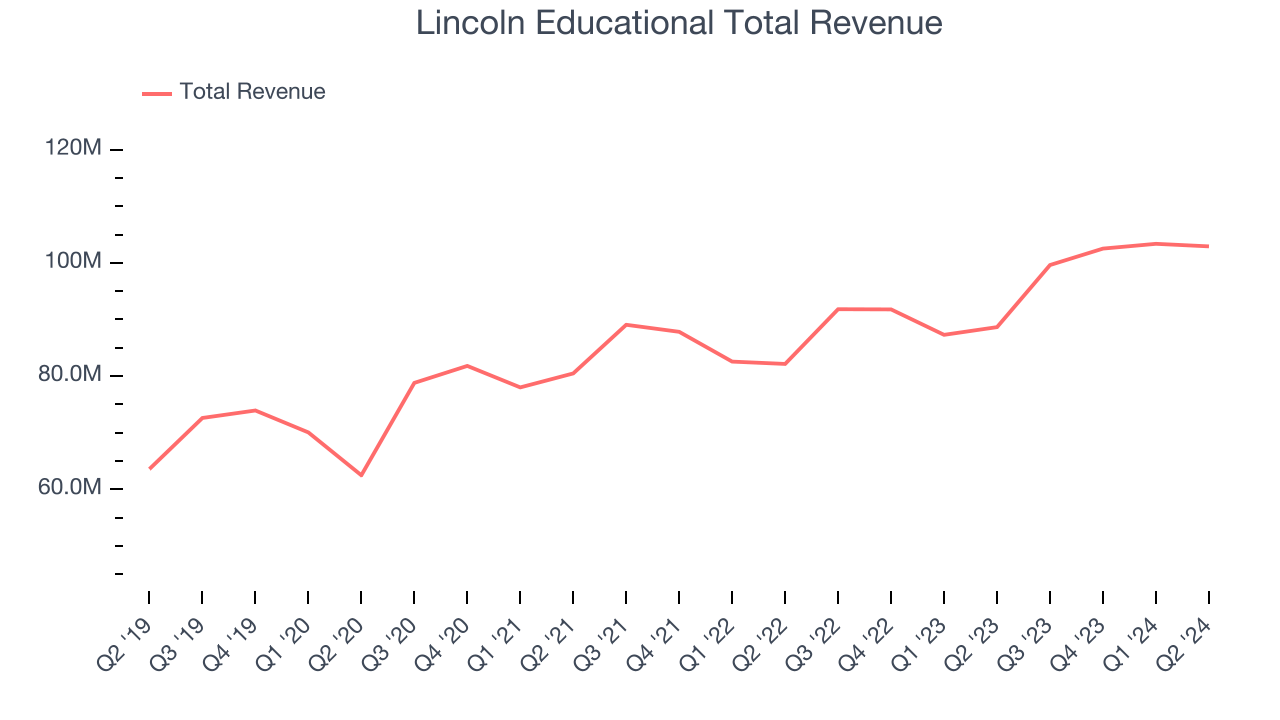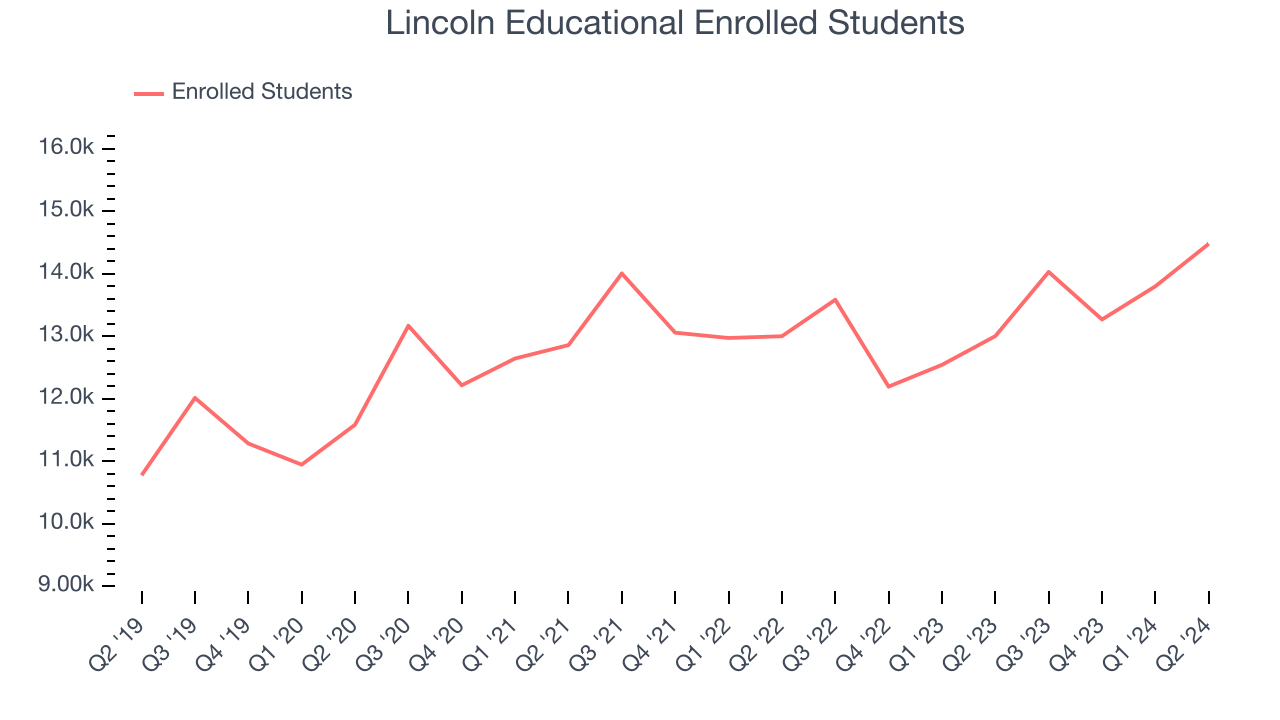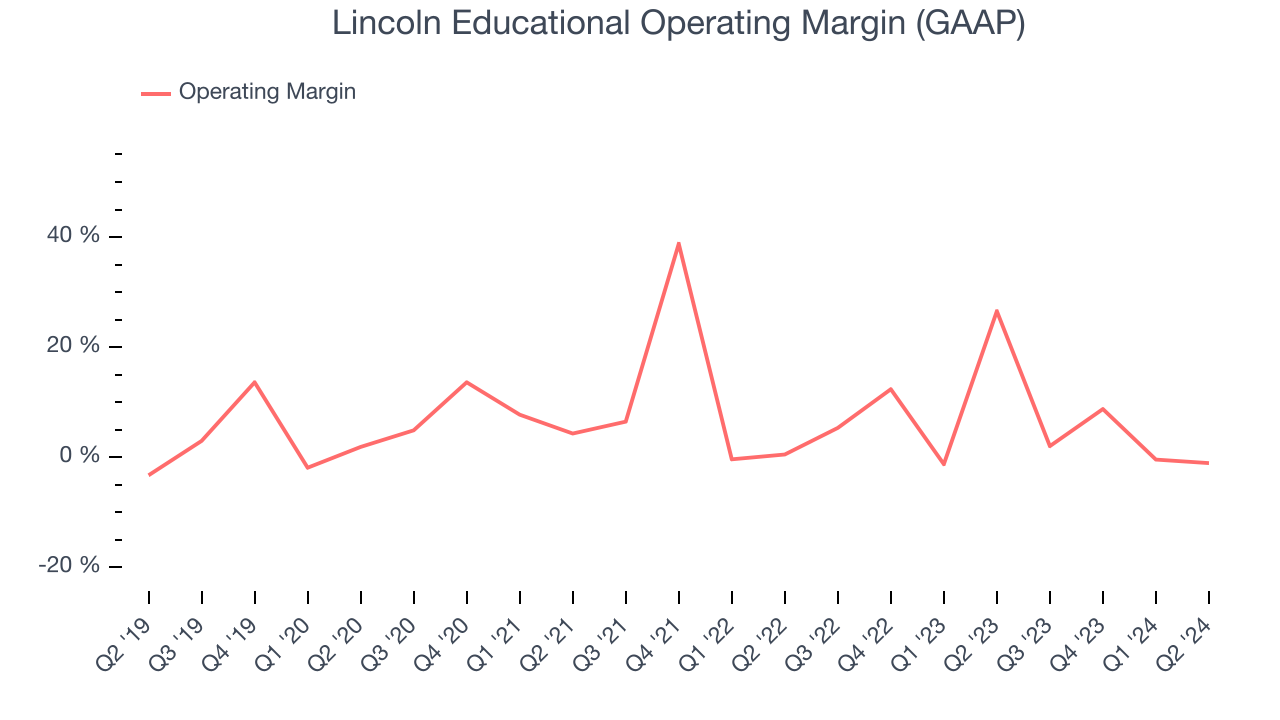Education company Lincoln Educational (NASDAQ:LINC) reported Q2 CY2024 results beating Wall Street analysts' expectations, with revenue up 16.1% year on year to $102.9 million. The company expects the full year's revenue to be around $426.5 million, in line with analysts' estimates. It made a GAAP loss of $0.02 per share, down from its profit of $0.57 per share in the same quarter last year.
Is now the time to buy Lincoln Educational? Find out by accessing our full research report, it's free.
Lincoln Educational (LINC) Q2 CY2024 Highlights:
- Revenue: $102.9 million vs analyst estimates of $100.6 million (2.3% beat)
- EPS: -$0.02 vs analyst estimates of -$0.01 (-$0.01 miss)
- The company slightly lifted its revenue guidance for the full year from $423 million to $426.5 million at the midpoint
- EBITDA guidance for the full year is $40.5 million at the midpoint, above analyst estimates of $39.63 million
- Gross Margin (GAAP): 55.7%, in line with the same quarter last year
- EBITDA Margin: 6.1%, up from 2.8% in the same quarter last year
- Enrolled Students: 14,481, up 1,477 year on year
- Market Capitalization: $366.3 million
“We continued our strong performance during the second quarter with revenue growing 16.1%, student starts increasing 12.3% and adjusted EBITDA more than doubling compared to last year,“ commented Scott Shaw, President & CEO.
Established in 1946, Lincoln Educational (NASDAQ:LINC) is a provider of specialized technical training in the United States, offering career-oriented programs to provide practical skills required in the workforce.
Education Services
A whole industry has emerged to address the problem of rising education costs, offering consumers alternatives to traditional education paths such as four-year colleges. These alternative paths, which may include online courses or flexible schedules, make education more accessible to those with work or child-rearing obligations. However, some have run into issues around the value of the degrees and certifications they provide and whether customers are getting a good deal. Those who don’t prove their value could struggle to retain students, or even worse, invite the heavy hand of regulation.
Sales Growth
Reviewing a company's long-term performance can reveal insights into its business quality. Any business can have short-term success, but a top-tier one tends to sustain growth for years. Unfortunately, Lincoln Educational's 8.9% annualized revenue growth over the last five years was sluggish. This shows it failed to expand in any major way and is a rough starting point for our analysis. 
Long-term growth is the most important, but within consumer discretionary, product cycles are short and revenue can be hit-driven due to rapidly changing trends and consumer preferences. Lincoln Educational's annualized revenue growth of 9.3% over the last two years aligns with its five-year trend, suggesting its demand was consistently weak.
We can better understand the company's revenue dynamics by analyzing its number of enrolled students, which reached 14,481 in the latest quarter. Over the last two years, Lincoln Educational's enrolled students averaged 2.6% year-on-year growth. Because this number is lower than its revenue growth during the same period, we can see the company's monetization has risen. 
This quarter, Lincoln Educational reported robust year-on-year revenue growth of 16.1%, and its $102.9 million of revenue exceeded Wall Street's estimates by 2.3%. Looking ahead, Wall Street expects sales to grow 6.7% over the next 12 months, a deceleration from this quarter.
Today’s young investors won’t have read the timeless lessons in Gorilla Game: Picking Winners In High Technology because it was written more than 20 years ago when Microsoft and Apple were first establishing their supremacy. But if we apply the same principles, then enterprise software stocks leveraging their own generative AI capabilities may well be the Gorillas of the future. So, in that spirit, we are excited to present our Special Free Report on a profitable, fast-growing enterprise software stock that is already riding the automation wave and looking to catch the generative AI next.
Operating Margin
Lincoln Educational's operating margin has shrunk over the last year and averaged 6.2%. The company's profitability was mediocre for a consumer discretionary business and shows it couldn't pass its higher operating expenses onto its customers.

In Q2, Lincoln Educational generated an operating profit margin of negative 1.1%, down 27.6 percentage points year on year. This contraction shows it was recently less efficient because its expenses grew faster than its revenue.
Key Takeaways from Lincoln Educational's Q2 Results
It was good to see Lincoln Educational beat analysts' revenue expectations this quarter. We were also glad it raised its full-year revenue and EBITDA guidance, which came in higher than Wall Street's estimates. On the other hand, its EPS missed. Overall, this was a decent quarter for Lincoln Educational. The stock remained flat at $11.65 immediately after reporting.
So should you invest in Lincoln Educational right now? When making that decision, it's important to consider its valuation, business qualities, as well as what has happened in the latest quarter. We cover that in our actionable full research report which you can read here, it's free.
